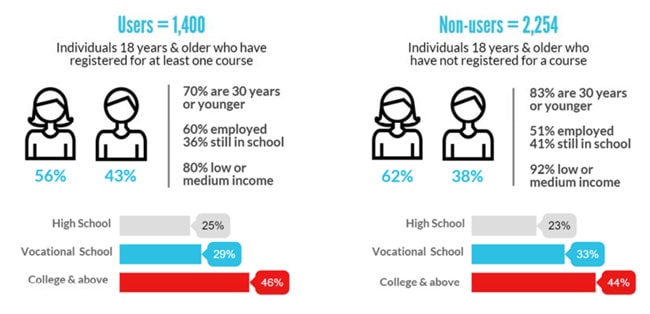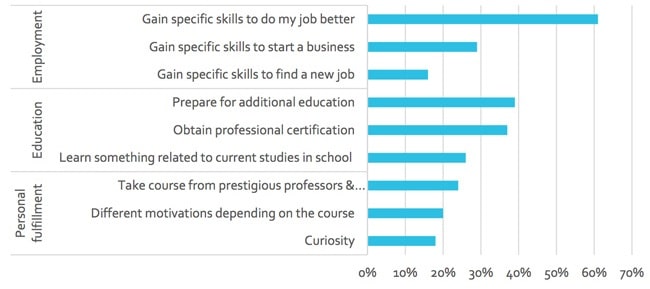MOOC learners in developing countries focused on career development
If an interesting new study from the University of Washington is any indication, MOOC students in developing countries have a very different profile than their counterparts in North America or Europe. They also bring distinct motivations - especially with respect to career development - and are more likely to complete their studies.
The prevailing wisdom about MOOC students (and fair enough because most of these observations are based in a number of credible studies of online learners) has it that registrants tend to be young, employed, well-educated, and male. And in the relatively short history of MOOCs, most of those students have come from North America or Europe.
But less is known about MOOC students in developing countries, and the team from the Technology and Social Change Group (TASCHA) at the University of Washington set out to try and fill this gap with a study that encompassed both users and non-users of MOOCs in three emerging markets: Colombia, the Philippines, and South Africa.
"Many people assumed that in developing countries, MOOCs would only be used by the rich and well-educated," said lead researcher Maria Garrido, research assistant professor at TASCHA. "We were excited to find that this is not the case. Many users come from low- and middle-income backgrounds with varying levels of education and technology skills."
The TASCHA team surveyed a sample of 1,400 MOOC users aged 18–35 across the three countries, and a further cohort of 2,254 non‐users (also aged 18–35 years). The survey responses were then rounded out with interviews with government officials, educators, and employers in all three countries.

Who are these students?
TASCHA found that neither income nor technical expertise are barriers to MOOC study in developing countries. "Income level does not determine young people’s engagement with MOOCs," notes the study report. Eight in ten MOOC learners in the survey were low or middle-income, in contrast to the relatively higher-income students that are more typically observed in North America or Europe. Most respondents (70%) were 30 years old or younger. One in four had completed high school, another third had completed vocational studies, and the rest had a first university degree or better. Most were also either employed (60%) or enrolled in school (36%). Interestingly, the MOOC users in the study were not characterised by advanced computer skills. Eight in ten had only basic or intermediate-level technical skills, a finding that challenges the another prevailing idea that MOOCs are for those with more advanced information technology skills. Indeed, the study found that, among non-users, lack of awareness was by far the biggest barrier to MOOC studies (79% had never heard of MOOCs). Among those non-users who did know something about MOOCs, most (50%) were prevented simply by a lack of time to pursue their studies. The population of MOOC users in the three study countries skewed younger, and was from more diverse educational backgrounds, compared to learners in developed countries.
Why are they studying?
When it comes to developed countries, the report points out, "Students enrol in MOOCs with different goals in mind. Satisfying their curiosity and advancing their jobs are two of the most common reasons. While participants enrol with the specific intention to obtain a certificate, or even multiple certificates, many others are less interested in working through a full course." That is, students in developed countries commonly enrol in MOOCs out of curiosity, personal interest, or for the sake of sampling the course material. It is also generally observed that such students tend to complete their courses far less often.
In contrast, TASCHA found that learners in developing countries were much more focused on career development. More than six in ten (61%) said their main motivation for taking an online course was to gain specific job skills. Another 37% were trying to obtain a specific professional certification, and another notable group (39%) said their main reason for signing up was to prepare for further education.



















